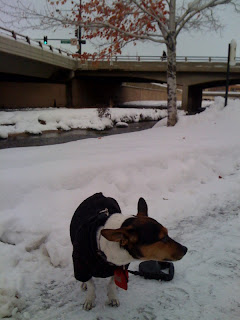STATUS: Sorry about no blog entry on Friday. The whole day got away from me.
What’s playing on the iPod right now? A KIND OF MAGIC by Queen
No doubt, I’ve been on a ranting streak for awhile. For a nice change, how about a blog entry on a midlist series getting a second life. Let’s talk about something positive today rather than more of my righteous indignation. Grin.
Here is Mari Mancusi. Author of the YA BLOOD COVEN vampire series—originally started years ago, before the craze, but now have new covers and a new floor display in Borders.
Never Give Up…Never Surrender!
I know I can’t be the only author who mutters the Galaxy Quest creed every time the publishing industry throws me a curve ball. This particular time was three years ago, when I got an email from a fellow author, published by the same publishing house that did my Blood Coven Vampires series.
“They’re not picking up anyone’s options!” she lamented.
Shocked, I frantically called Kristin and she started to do some digging. Turns out, the author was right. My publisher was basically fading out their YA line and concentrating more on their core business of adult romance.
My series was basically DOA before the third book had even come out.
I was devastated. Though I’d written other books, none meant as much to me as my little vampire series. And I hated disappointing all my loyal readers who, after Book #3 – Girls that Growl – was released, kept begging for more. But what could I do? Kristin went back to the publishing company to ask again and again, but they kept saying no.
Of course, I could have given up then and there. After all, I’d just gotten a new children’s publisher and was under contract for two hardcover books at a much higher royalty rate. I could have easily moved on and said goodbye to my blood coven vampires. To my twin heroines, Sunshine and Rayne.
But the series meant too much to me for that. And it meant too much to my readers who kept begging to know what happens next. So I kept pushing. I started a “Save the Blood Coven” campaign in which I got readers to help spread the word and get bookstores and libraries to stock it. I did videos, I enlisted a street team, I encouraged my readers not to let the big corporations decide what they got to read.
And so the sales continued, slow but steady, over the next two years. And every day I’d have new teens write to me and say they’d just recently discovered the series. But though the publisher kept reprinting the first three books, they also kept refusing to buy book #4.
Then, out of the blue, something strange happened. My editor from Germany wrote me an email, asking about book #4. She said she didn’t care if the US published it or not. Would I consider writing it just for them?
I decided to do it. Namely because it allowed me to continue writing my beloved series. And Kristin and I schemed for alternative ways to get it to a US audience. Maybe a small publisher would see the Bookscan numbers and see it as an opportunity. Maybe we could sell it POD since I already had a fan base. Or I could give it away as an e-book. Somehow – someway – I was determined to get that story to my readers, no matter what!
But before pursuing those more drastic options, Kristin decided to go back one last time to my US publisher, to see if they’d changed their minds. After all, the Twilight movie had just swept into theaters and vampires were hotter than ever.
And low and behold, they said yes. Not only yes to a fourth book, but also that they would reprint the first three books as well, with shiny new covers for a whole new generation of (vampire hungry) fans!
I think I cried when Kristin told me the good news. She, in return, said that the sale, in many ways, meant more to her than ones she’d made for six figures because this particular sale was a victory. The result of a two year battle that seemed hopeless until the very end. But we didn’t give up. We didn’t surrender.
And sometimes, even in these bad economic times, a story of publishing can actually have a happy ending!
Mari
Visit the series at www.bloodcovenvampires.com









